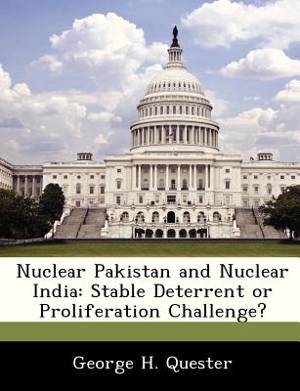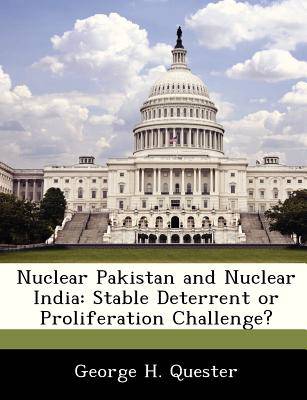
Door een staking bij bpost kan je online bestelling op dit moment iets langer onderweg zijn dan voorzien. Dringend iets nodig? Onze winkels ontvangen jou met open armen!
- Afhalen na 1 uur in een winkel met voorraad
- Gratis thuislevering in België vanaf € 30
- Ruim aanbod met 7 miljoen producten
Door een staking bij bpost kan je online bestelling op dit moment iets langer onderweg zijn dan voorzien. Dringend iets nodig? Onze winkels ontvangen jou met open armen!
- Afhalen na 1 uur in een winkel met voorraad
- Gratis thuislevering in België vanaf € 30
- Ruim aanbod met 7 miljoen producten
Zoeken
Nuclear Pakistan and Nuclear India
Stable Deterrent or Proliferation Challenge?
George H Quester
Paperback | Engels
€ 20,45
+ 40 punten
Omschrijving
Nuclear proliferation, a security issue which has transcended the cold war, has been, and is, particularly troublesome in South Asia. There, India and Pakistan, neighbors with unresolved disputes since they were granted independence at the end of World War II, are believed to have nuclear weapons (although the leaders of both nations deny it) and are intermittently engaged in conflict with each other. Professor Quester has examined this unique nuclear relationship, analyzing the attitudes and behavior of both nations. He concludes with a paradox: both have "bombs in the basement," if not in their respective military inventories, and these weapons present serious dangers to the world simply because of their destructive potential, even if their leaders have the best intentions. On the other hand, Indian and Pakistani leaders appear to have low levels of concern about each others' nuclear (not conventional military) developments. It is possible to be optimistic and conclude that the relationship is actually stable and, like the U.S.-Soviet nuclear relationship of the cold war, helps prevent war on the subcontinent, or to be cynical and conclude that each regime cares more about the prestige of membership in the nuclear club than the ominous threat posed thereby against their populations.
Specificaties
Betrokkenen
- Auteur(s):
- Uitgeverij:
Inhoud
- Aantal bladzijden:
- 26
- Taal:
- Engels
Eigenschappen
- Productcode (EAN):
- 9781288283330
- Verschijningsdatum:
- 12/11/2012
- Uitvoering:
- Paperback
- Formaat:
- Trade paperback (VS)
- Afmetingen:
- 189 mm x 246 mm
- Gewicht:
- 68 g

Alleen bij Standaard Boekhandel
+ 40 punten op je klantenkaart van Standaard Boekhandel
Beoordelingen
We publiceren alleen reviews die voldoen aan de voorwaarden voor reviews. Bekijk onze voorwaarden voor reviews.











